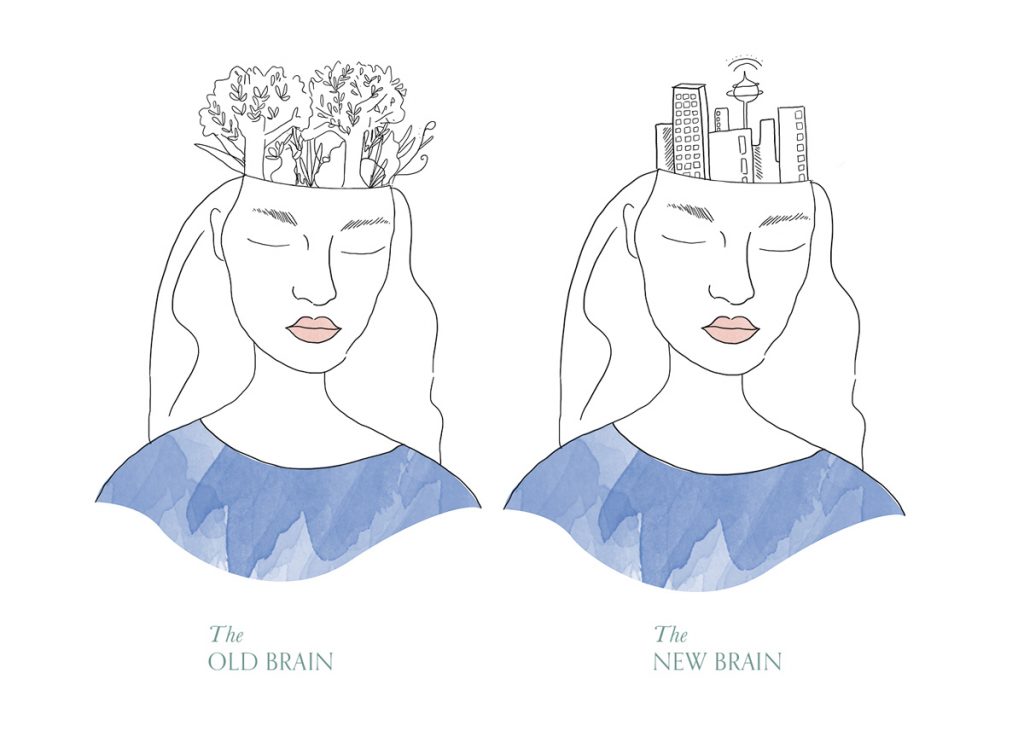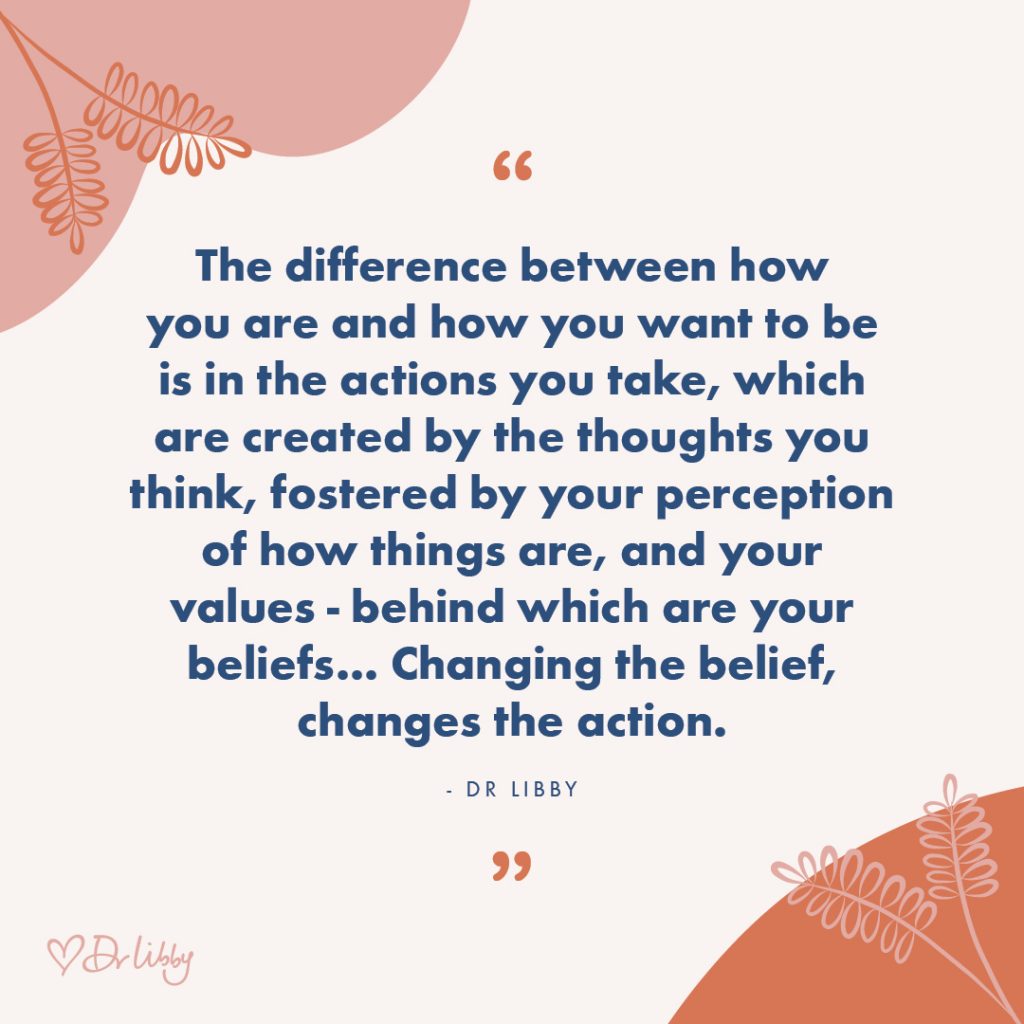It’s incredibly frustrating to feel as though you’re working against yourself. That no matter how hard you try, no matter what you learn, you somehow seem to end up sabotaging your own best efforts.
So why do we do what we do, when we know what we know? And why do we, at times, seemingly work against our own best interests?
There are many reasons but most often it comes down to what’s happening inside our mind.
Here’s a useful way to think about our modern brain. We have two thought systems. You might like to think of them as old and new, or reptilian and adapted—for now, I will refer to them as Old Brain and New Brain. The former is rapid, emotional and intuitive (with ‘intuitive’ in this instance meaning a reactive, instantaneous processing that occurs based on prior experience – patterns and associations – about what kept us safe), while the latter is much slower, and able to apply logic, calculate and rationalise. The New Brain doesn’t automatically examine the Old Brain and understand why it does what it does. New Brain doesn’t usually even know that Old Brain has made a decision!
The Old Brain has a style of wiring that was laid down across the millions of years of our history to help us survive. That still runs much of the show today, whether we choose for this to be the case or not. This part of our brain and the thought system it generates is constantly alert to danger and is always scouting out for potential situations that may threaten our lives. Our New Brain can see and learn and understand how things have changed so rapidly. Yet, our Old Brain is busy creating meanings from the situations we are involved with in an attempt to keep us safe. The problem is, the meanings are made up. They’re not fact.
The lack of understanding between these two thought systems is a major driving force behind us being our own worst enemy. When so much of our behaviour and so many of our choices are made instantaneously by our Old Brain we need to actively employ New Brain to examine what Old Brain is doing. We have not yet evolved for them to find common ground or to start to rewire ourselves away from some of the outdated survival patterns.

Here are three ways to use your New Brain to stop being your own worst enemy.
1. Look to your past as an opportunity for growth
Too often we look upon what we perceive are our mistakes or difficulties we’ve faced and use them to judge and criticise ourselves or to cement a sense that life is unfair. This only perpetuates more judgement and more criticism and leads to us feeling even lousier about ourselves. Here’s the thing. All of us experience hardship in our lives, differing degrees, but hardship nonetheless. Most of it is out of our control. One thing that is in our control is how we respond to what has happened.
If there are things in your past that you feel ashamed of, or things in your past that have been difficult, instead of judging or blaming yourself or others, ask yourself these two questions:
- If there were a gift in this situation, I wonder what that might be?
- If there were an opportunity for me to grow from this situation, I wonder what that might be?
Leave judgement at the door and simply be curious about what you can glean from your past that may help your future to be more aligned with what you want. And remember: from pain we grow. Pain offers us insight into what our Soul needs us to learn and forms a solid foundation for a meaningful life.
2. Get familiar with your self-limiting beliefs
Your behaviour is the outer-most expression of your beliefs. The challenge is, most people aren’t taught to examine what they believe about themselves, what occurs in their lives, or their choices, and instead they just don’t really understand why they do what they do, even though they know what they know. Understanding that your mind creates meanings from what occurs every moment of every day, helps you to begin to unravel and gain deeper insights into your life and choices.

To become aware of your beliefs about yourself and the world—especially those that aren’t serving you—start paying attention to your thoughts. Your thoughts will be a reflection of what you believe, some more direct than others. I recently presented a TEDx talk on how our thoughts drive stress if you’d like to learn more about this.
3. Work on increasing your emotional intelligence (EQ)
Part of EQ is having an ability to recognise, observe and modulate your emotional response to what happens in your life and in your relationships. It’s not much fun walking around being triggered by every comment, action or situation; feeling sad, mad and hurt by more things than not. Contrary to what you may think, most of what we feel is driven by our beliefs and the meanings our Old Brain makes to keep us safe. It’s not the behaviour or actions of others or the curve balls life throws our way. It’s our response to those things. Creating some space between what we feel and how we react can help us to better understand what might be driving our emotions. That’s easier said than done sometimes, yet, with practise you will find it becomes much easier.
The next time you feel triggered, try to pause for a moment and reflect on what might be at the heart of it. If someone else is involved perhaps ask them what motivated them to behave or act in the way that they did. It might be for an entirely different reason than you perceived. Also ask yourself what meaning you made from what happened. Is that story true or based on past associations that may not be true in this instance? With a deeper understanding you will find you are better able to respond with consideration rather than reacting based on the meaning you created.









